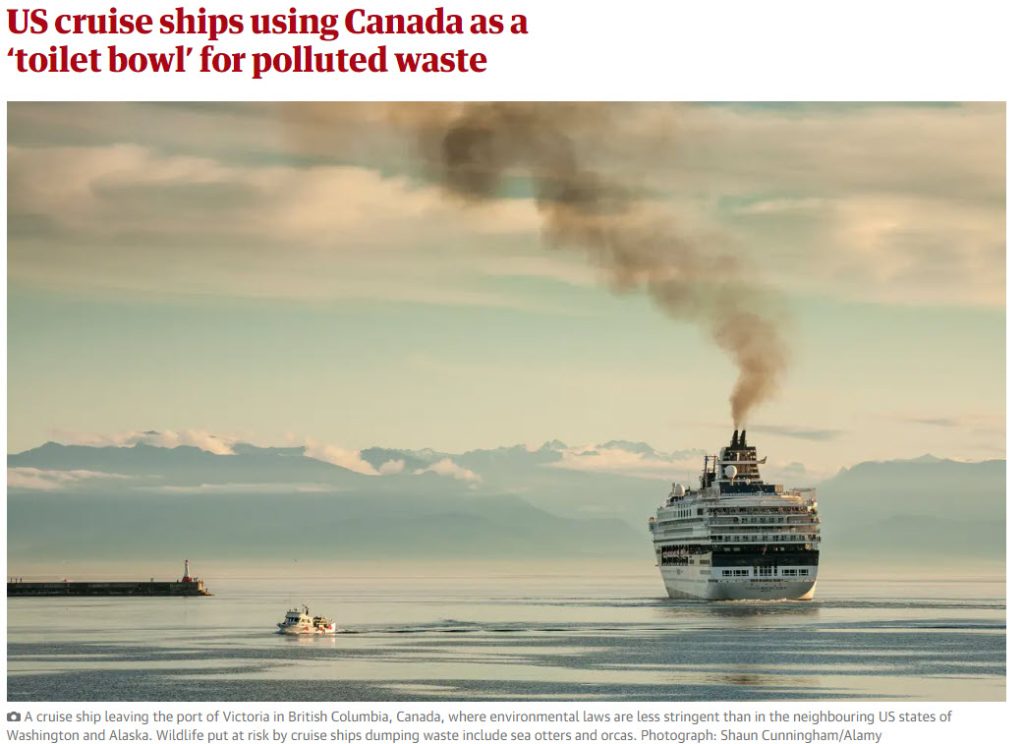This picture below is from a feature article in (UK’s) The Guardian last July. This is where I live. The breakwater walkway on the left side of the picture is a 10 minute walk from my James Bay neighbourhood residence in Victoria. Across the waters rise up the Olympic Mountains. A beautiful landscape, except…
The Conflict
As a relative newbie in the James Bay neighbourhood (the oldest west coast residential neighbourhood north of San Francisco), it didn’t take me long to attune to the cruise ships and the conflict that their presence incurs, for some.
Victoria isn’t a cruise destination. The cruise ships typically dock only in Victoria for a few hours, on their return from Alaska (the destination) en route to Seattle. The Victoria stop is to avoid mega millions of dollars in fees related to the U.S. Passenger Services Vessel Act. That said, they do stop. I routinely have a steady stream of cruise ship passengers travelling past my place on their way to take in Victoria’s downtown sites.
The benefits of cruise ships and their passengers is up for debate.
On one hand, there is a business lobby advocating for and celebrating their presence; including the Greater Victoria Harbour Authority (owner/operator of the Victoria terminal where the ships dock) and the BC Government; BC ends cruise season with near-record numbers.
On the flip side, are neighbourhood residents, tired of the pollution and noise, advocating for a “locals first” approach to cruise tourism, and west coast’s Stand.Earth, who commissioned the April 2022 report, “Missing the Boat: Comparative Economic Impacts of Cruise & Non-Cruise Tourism in Greater Victoria‘, crunched the data and showed the “economic benefits of non-cruise tourism dwarf cruise tourism” (20 times as much), in Victoria.
Throw in a international perspectives and actions related to cruise tourism and you have a potpourri of conflict covering land and the high seas.
The Search for Solution Options
As a former mediator, I am always curious and searching for solution options to conflict. Diverge on the problem before you converge on the solution. To solve a difficult challenge, one has to come up with as many solution ideas and options as possible. Then its “murder your darlings”. Converge on the best. A continuum of options makes it easier to negotiate a solution that serves mutual interests. Diverge then converge is also the pathway to innovation.
Last week, I came across some creative (and visionary) options to the status quo (which from my lens is not a win-win option) via an article by Jennifer Button in my local James Bay Beacon community newspaper. Jennifer was a lawyer for the BC Ministry of Justice for more than 25 years. She is now a consultant on justice issues, and has lived in James Bay since 1993.
From the October 2022 edition of the Beacon:
“Many port cities around the world are discussing the negative effects of cruise ships. That discussion needs to take place actively in Victoria. Severely limiting the number and/or the size of cruise ships that dock in James Bay has been long proposed. Unlike the massive cruise ships that currently dock here, there exist small-ship lines that operate in an environmentally responsible manner and whose docking does not disrupt the daily lives of the communities they visit. For instance, see Lindblad Expeditions.
Others propose a more radical option: remaking the environmentally-unfriendly concrete cruise ship terminal into a grassed and treed park for the enjoyment of citizens and non-cruise ship tourists. This model could include such mixed commercial, residential tourist activities as a permanent market, a reinvigorated Maritime Museum, an outdoor pool, a small hotel, local boating opportunities and possibly some small cruise ships.”
Its options like those that make it possible to build common ground solutions.
Epilogue
This past weekend Victoria elected a new Mayor and Council. There was almost a 90% turnover . Proponents of a ‘progressive’ agenda, won out. Other municipalities in the Capital Region also saw major changes in the makeup of their councils. A sea change.
Jennifer says it will “take courage and creativity for the GVHA Board to move to a more environmentally-and people-friendly economic model for our Harbour. But the Board has a responsibility to the citizens of Victoria to take on this challenge.”
I firmly believe the GVHA is up to it. The timing couldn’t be better.


Speak Your Mind